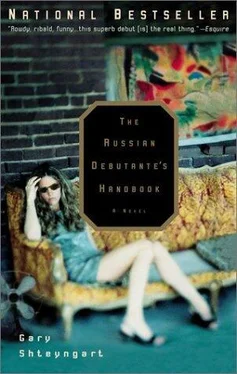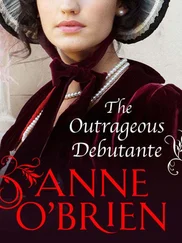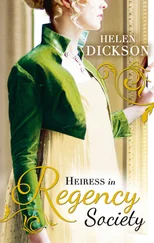Gary Shteyngart - The Russian Debutante's Handbook
Здесь есть возможность читать онлайн «Gary Shteyngart - The Russian Debutante's Handbook» весь текст электронной книги совершенно бесплатно (целиком полную версию без сокращений). В некоторых случаях можно слушать аудио, скачать через торрент в формате fb2 и присутствует краткое содержание. Город: New York, Год выпуска: 2003, ISBN: 2003, Издательство: Riverhead Books, Жанр: Современная проза, Юмористическая проза, на английском языке. Описание произведения, (предисловие) а так же отзывы посетителей доступны на портале библиотеки ЛибКат.
- Название:The Russian Debutante's Handbook
- Автор:
- Издательство:Riverhead Books
- Жанр:
- Год:2003
- Город:New York
- ISBN:0-7865-4177-6
- Рейтинг книги:4 / 5. Голосов: 1
-
Избранное:Добавить в избранное
- Отзывы:
-
Ваша оценка:
- 80
- 1
- 2
- 3
- 4
- 5
The Russian Debutante's Handbook: краткое содержание, описание и аннотация
Предлагаем к чтению аннотацию, описание, краткое содержание или предисловие (зависит от того, что написал сам автор книги «The Russian Debutante's Handbook»). Если вы не нашли необходимую информацию о книге — напишите в комментариях, мы постараемся отыскать её.
and
. The Russian Debutante’s Handbook Bursting with wit, humor, and rare insight,
is both a highly imaginative romp and a serious exploration of what it means to be an immigrant in America.
The Russian Debutante's Handbook — читать онлайн бесплатно полную книгу (весь текст) целиком
Ниже представлен текст книги, разбитый по страницам. Система сохранения места последней прочитанной страницы, позволяет с удобством читать онлайн бесплатно книгу «The Russian Debutante's Handbook», без необходимости каждый раз заново искать на чём Вы остановились. Поставьте закладку, и сможете в любой момент перейти на страницу, на которой закончили чтение.
Интервал:
Закладка:
Vladimir pretended to busy himself with his flounder. His father had never talked with such candor about his dealings, although nothing was ever hidden from Vladimir. Especially since Mother had always gloated about how she, with only the abysmal education of a Soviet kindergarten teacher, had risen to such corporate prominence legally, while poor, stupid Father had to spend his days defrauding America’s paradoxical health care system.
“But as for you, son, my advice is: you do what you want to do. That’s my final pronouncement. Look at me. I never cared about medicine, about saving or prolonging the lives of my patients, not that I’m such a bad person. I care about other things: fishing, gardening, the opera. The only medical fascination I ever had was on those freight trains with the women. Then your grandmother said to me: become a doctor, you’re smart, you’ll do well. Well, it certainly turned out to be a lucrative profession in America, the way we practice it here, anyway.” He swung his arm around to indicate he meant Fortress Girshkin with the little doctor’s shingle blowing in the breeze underneath a fake antique lamp.
Vladimir’s father finished off his mug and reached for a vodka refill. “Oh, yes,” he said. “Please do what you want to do with your life. What do you want to do, anyway?”
“I’m not sure,” Vladimir said. “Maybe I want to teach.” Teach? Where the hell did that come from?
“Teaching, now that’s a strange kind of profession,” said his father. “There are some very unexceptional people out there teaching. And what if they send you to teach those kids in Harlem? Or the Bronx? Or Brooklyn? Or Queens? They’d tear you apart, those little animals. I was thinking, are you good with computers at all? Oh, but listen to me. Now I’m telling you what you should do. No, let’s drink to your happy but impractical pedagogic dreams.”
“And to Grandmother’s health,” Vladimir said.
“Yes, to that crazy old woman.” Dr. Girshkin finished the contents of his mug, then squeezed his mustache for stray drops of the familiar liquid. He sighed, breathing out the firewater. “You know, Vladimir, you and your grandmother are really all I have to live for in the world, well, as far as any man has to live for other people—what is it they say?—no man is an island. Your mother, nu, I picture she’ll be here with me till the end. We are like one of those many unfortunate corporate mergers they’ve had in the past decade; we are like Yugoslavia. But if I had to answer the question, who would I die for, if there was, say, a plane hijacking and the hijackers said that one of us had to be killed, well, I’d die for you or Grandmother without thinking twice.”
Vladimir wiggled his toes in the tight childhood slippers (made of a resilient moleskin that lent itself to a frisky, animal foot odor) that his parents had saved and forced him to wear during visits. “Why would you die for Grandmother?” he asked. “She’s older.”
“It’s a good question,” said Vladimir’s father and concentrated on it for a spell while chewing on the flabby underhang of his thumb. It was clear to Vladimir that his father had thought out this hijacking scenario many times. “I would say conclusively that I do not have all that much to live for in my life. I don’t mean to sound especially sad but I’m sure many men my age would come to that conclusion. I think the only reason that I would not give up my life in exchange for Grandma’s is to be a father to you, but it seems to me that you really haven’t needed me as a father for some time now. You have a life that’s so far removed from this house, which we worked so hard, your mother and I, to put together, that sometimes… well, I wonder what the point was.”
Vladimir considered his new life with the Ruoccos. How far he had come. Yes. What was the point of all that hard work? “Well, I hope we never all get hijacked,” he said, moving aside his plate with the fragmented fish skeleton and wiping his dry brow with a napkin.
“I hope so too,” Vladimir’s father said, although his son remained unconvinced. If not in his professional or family life, then at least by dying at the hands of those reprehensible hijackers with the handlebar mustaches, Dr. Girshkin would be meted out a slice of dignity for all the world to see.
“So remember what we talked about today,” said his father. “The most important thing: you do what you want to do. And also, don’t get married unless you are ready to lose your happy youth. These are the two lessons we’ve learned today.”
Vladimir’s father got up, balancing himself against the plastic lawn table. He shook his bad leg (it had fallen asleep during dinner), then looked back to make sure Grandmother was all right as she wheeled herself about the Girshkin gardens. Having satisfied himself of his mother’s well-being, Dr. Girshkin limped back into the kitchen to fetch tea and cake, leaving Vladimir to hope that his father had said everything he wanted to say to him.
But he hadn’t.
AN HOUR LATER,his cheeks burning from his father’s kisses, Vladimir was conveyed from village to city by the 8:12 P.M. Metro-North local train. If his peripheral vision was correct, he could have sworn he saw the flash of Mother’s amber brooch, a cheap Baltic treasure, in a train carriage headed in the opposite direction. Soon she would be back in the house, half-asleep on the couch, quietly enumerating for her husband the ignominies suffered during her fourteen-hour work day, the whisperings of American underlings behind her back, the mysterious cabals in the men’s room that were surely the signs of a native rebellion, a corporate coup d’etat. They always wanted more, the native-born. More money. Better health coverage. Endless two-week vacations. This is what happened when parents didn’t set limits for their children, when one was born into a boundless world.
“Please, porcupine, your troglodyte workers are scared to death of you,” the doctor would reassure his wife, as he brought her little dishes of eggplant caviar and whitefish salad, a cup of herbal tea to soothe her nerves. He would prop a pillow under her feet and tune the television to the show they both loved—the one where felonious movie stars were exposed for who they really were.
MEANWHILE, IN HERupstairs bedroom, Grandmother would be dreaming of a lone oak tree hulking over a garden of milkweed and evening primrose, and in the shade of the oak tree that bow-legged goy from the village regiment, a shiny red star on his army cap, would look up from his kasha bowl and smile his abundant country smile for her. Suddenly, they would be dancing a mazurka in some big-city palace of culture, and he would press her against his chest and kiss her lips, first chastely then not… Because here in the hermitage of Grandmother’s dreams, among the wispy force fields of desire and history floating over the American suburbs, the kindly Sergeant Yasha finally loved her and there was enough happiness for all.
Downstairs, Dr. Girshkin was still awake. He examined his wife fast asleep on the couch, considered the difficulty of transporting her up to her bedroom, and, shaking his head in regret, retired to his basement abode.
In the basement, surrounded by plaster dust and loose electrical wires, the doctor had tried to recreate for himself the rickety village izba where he had spent his childhood: coarse off-white panels lining the walls were supposed to bring to mind the Russian birch; a set of unfinished wooden chairs gathered around a three-legged kitchen table bespoke an admirable poverty. On this table, there was some Pushkin, a little Lermontov, and, for some reason, a wayward copy of the New England Medical Journal, which the doctor quickly shunted under his bed. The great warm stove, the centerpiece of his youth, was missing from the ensemble, but what could one do?
Читать дальшеИнтервал:
Закладка:
Похожие книги на «The Russian Debutante's Handbook»
Представляем Вашему вниманию похожие книги на «The Russian Debutante's Handbook» списком для выбора. Мы отобрали схожую по названию и смыслу литературу в надежде предоставить читателям больше вариантов отыскать новые, интересные, ещё непрочитанные произведения.
Обсуждение, отзывы о книге «The Russian Debutante's Handbook» и просто собственные мнения читателей. Оставьте ваши комментарии, напишите, что Вы думаете о произведении, его смысле или главных героях. Укажите что конкретно понравилось, а что нет, и почему Вы так считаете.












